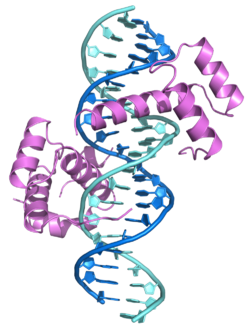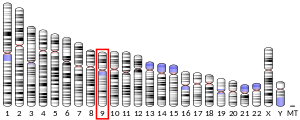Pre-B-cell leukemia transcription factor 3 is a protein that in humans is encoded by the PBX3 gene.[5][6]
References
edit- ^ a b c GRCh38: Ensembl release 89: ENSG00000167081 – Ensembl, May 2017
- ^ a b c GRCm38: Ensembl release 89: ENSMUSG00000038718 – Ensembl, May 2017
- ^ "Human PubMed Reference:". National Center for Biotechnology Information, U.S. National Library of Medicine.
- ^ "Mouse PubMed Reference:". National Center for Biotechnology Information, U.S. National Library of Medicine.
- ^ Monica K, Galili N, Nourse J, Saltman D, Cleary ML (Dec 1991). "PBX2 and PBX3, new homeobox genes with extensive homology to the human proto-oncogene PBX1". Mol Cell Biol. 11 (12): 6149–57. doi:10.1128/mcb.11.12.6149. PMC 361792. PMID 1682799.
- ^ "Entrez Gene: PBX3 pre-B-cell leukemia homeobox 3".
Further reading
edit- Lu Q, Wright DD, Kamps MP (1994). "Fusion with E2A converts the Pbx1 homeodomain protein into a constitutive transcriptional activator in human leukemias carrying the t(1;19) translocation". Mol. Cell. Biol. 14 (6): 3938–48. doi:10.1128/mcb.14.6.3938. PMC 358760. PMID 7910944.
- Shen WF, Rozenfeld S, Kwong A, et al. (1999). "HOXA9 Forms Triple Complexes with PBX2 and MEIS1 in Myeloid Cells". Mol. Cell. Biol. 19 (4): 3051–61. doi:10.1128/mcb.19.4.3051. PMC 84099. PMID 10082572.
- Fujino T, Yamazaki Y, Largaespada DA, et al. (2001). "Inhibition of myeloid differentiation by Hoxa9, Hoxb8, and Meis homeobox genes". Exp. Hematol. 29 (7): 856–63. doi:10.1016/S0301-472X(01)00655-5. PMID 11438208.
- Knoepfler PS, Sykes DB, Pasillas M, Kamps MP (2001). "HoxB8 requires its Pbx-interaction motif to block differentiation of primary myeloid progenitors and of most cell line models of myeloid differentiation". Oncogene. 20 (39): 5440–8. doi:10.1038/sj.onc.1204710. PMID 11571641.
- Strausberg RL, Feingold EA, Grouse LH, et al. (2003). "Generation and initial analysis of more than 15,000 full-length human and mouse cDNA sequences". Proc. Natl. Acad. Sci. U.S.A. 99 (26): 16899–903. Bibcode:2002PNAS...9916899M. doi:10.1073/pnas.242603899. PMC 139241. PMID 12477932.
- Ota T, Suzuki Y, Nishikawa T, et al. (2004). "Complete sequencing and characterization of 21,243 full-length human cDNAs". Nat. Genet. 36 (1): 40–5. doi:10.1038/ng1285. PMID 14702039.
- Humphray SJ, Oliver K, Hunt AR, et al. (2004). "DNA sequence and analysis of human chromosome 9". Nature. 429 (6990): 369–74. Bibcode:2004Natur.429..369H. doi:10.1038/nature02465. PMC 2734081. PMID 15164053.
- Rhee JW, Arata A, Selleri L, et al. (2004). "Pbx3 Deficiency Results in Central Hypoventilation". Am. J. Pathol. 165 (4): 1343–50. doi:10.1016/S0002-9440(10)63392-5. PMC 1618620. PMID 15466398.
- Gerhard DS, Wagner L, Feingold EA, et al. (2004). "The Status, Quality, and Expansion of the NIH Full-Length cDNA Project: The Mammalian Gene Collection (MGC)". Genome Res. 14 (10B): 2121–7. doi:10.1101/gr.2596504. PMC 528928. PMID 15489334.
- Rual JF, Venkatesan K, Hao T, et al. (2005). "Towards a proteome-scale map of the human protein-protein interaction network". Nature. 437 (7062): 1173–8. Bibcode:2005Natur.437.1173R. doi:10.1038/nature04209. PMID 16189514. S2CID 4427026.
External links
edit- PBX3+protein,+human at the U.S. National Library of Medicine Medical Subject Headings (MeSH)
- FactorBook Pbx3
This article incorporates text from the United States National Library of Medicine, which is in the public domain.





